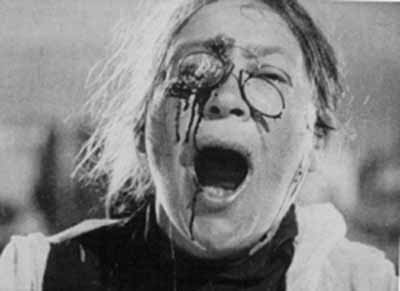Privatizing arts and culture not the solution to city’s financial woes
By Ania Szremski, Arts Editor
Illustration by Eric Baskauskas
“We need to cut the fluffery like NPR, the National Endowment for the Arts, those types of things — those are obvious.”
Sarah Palin’s statement on Greta Van Susteren’s show “On the Record” on January 1 may have been spoken by one of the most widely ridiculed politicians of our times, but the sentiment rings true for many. After all, thus far 2011 has been the Year of Crisis; since the beginning of January, the world has witnessed cataclysmic natural disasters, mass uprisings in the Middle East, and now desperate labor protests right here in the Midwest. Despite reports that the economy is improving, more and more businesses are announcing bankruptcy, and deficits at the city, state and federal level continue to grow at an alarming rate. In the midst of all this urgent hardship and turmoil, are the arts and culture really that important?
Not at all, says Sarah Palin — and the House of Representatives agrees. On February 17, a 217-209 vote passed a bill to slash funding for the National Endowment for the Arts by $20.6 million. And the NEA is lucky that it wasn’t worse; on January 20, the Los Angeles Times reported that the 165-member Republican Study Committee proposed the “Spending Reduction Act for 2011,” which advocated reducing federal spending by $2.5 trillion in part by completely eliminating the NEA, along with its “fluffy” counterparts, the National Endowment for the Humanities and the Corporation for Public Broadcasting.
The $20.6 million cut is the worst blow dealt to the NEA since the Culture Wars of 1995, when a disgruntled Republican-majority House and Senate moved to dissolve the NEA in retribution for funding what the GOP considered to be morally suspect art projects. In the end, they were unsuccessful, but they did manage to eliminate the NEA’s individual artist grants and cut its total budget by 39 percent, a cut that has remained in place since then.
With the recent censorship scandal at the Smithsonian fresh in our minds, this most recent spate of cuts to the arts might smack of a Culture Wars-type situation. But in this case, the government’s attempt to absolve itself of responsibility for funding arts and culture might be less motivated by Victorian priggishness than by sheer financial desperation, as well as by more general neoliberal tendencies towards privatization — Milton Friedman would have been proud of these developments.
That certainly seems to be the case here in Chicago. In December, the city made a move that foreshadowed the federal government’s actions this February. The entire Department of Cultural Affairs was sliced, diced, and tossed to the private sector, as lame duck Mayor Daley made some dramatic last-minute changes to city departments before giving up his throne.
On December 16, WBEZ blogger Jim DeRogatis broke the story that 20 DCA staffers had been summarily fired (making it a grand total of 29 DCA staffers fired since October), as several of the department’s primary functions were transferred to the newly privatized Chicago Tourism Fund. What was left of the department has since been merged with the Mayor’s Office of Special Events.
Peter Scales, of the city’s Office of Budget and Management, released this statement on these structural changes: “The following functions will be transferred to the Chicago Tourism Fund, effective January 1, 2011: visual/public art; tourism; cultural programs and grants; events, production, and retail; and some finance/administration. These will have no impact on current initiatives. In fact, the shifting of personnel should go unnoticed by residents and event participants.”
While it seems downright bizarre that an entity like the Chicago Tourism Fund would be in charge of the visual and public arts, what really got Chicagoans’ hackles up was the firing of beloved program manager Michal Orlove, the mastermind behind hugely popular free events like the World Music Festival. Unconvinced by Scales’s promise that Chicago’s cultural landscape wouldn’t really be impacted by these changes, local denizens sent out irate Facebook and twitter posts declaring undying support for Orlove (most of these posters were unaware that he had been rehired by the Chicago Tourism Fund in a different capacity).
Orlove published his only public statement on the situation in a post on his own Facebook page, stating, “This viral outpouring of support has been overwhelming and humbling to say the least. The past couple of weeks here have been quite difficult, especially having to watch many of my beloved colleagues go through this ordeal. It is hard to explain or understand why this all happened, but numerous dedicated and creative employees of the Department of Cultural Affairs have been terminated.”
At the heart of the worries over Orlove’s continued role (or not) with public programming is the debate over whether or not city festivals should be privatized, which would likely mean an end to free summer concerts. Since last fall, Daley has waffled back on forth on the issue, until recommitting to privatizing the festivals in early February. It’s now up to incumbent Mayor Rahm Emanuel to see that through.
Another big shock to Chicago’s art scene was DCA Commissioner Lois Weisberg’s sudden decision to resign from her 29-year tenure as of February 1. The move was motivated not only by her ire over the restructuring of her own department, but also by her concerns over the privatization of Chicago’s arts and culture. As Weisberg told DeRogatis in an interview for WBEZ, “My concern, and I think it was the concern of everybody in the arts community, was, ‘What was going to happen to our free festivals?’”
Everyone would probably prefer to get into Taste of Chicago for free and enjoy summer concerts in the park, but anecdotal evidence suggests that aside from that, the average Chicagoan does not share the arts community’s concerns over privatization. In fact, when a brief article on the Huffington Post reiterated DeRogatis’s doomsday death knell for the DCA, the majority of commentators seemed to agree with the Sarah Palin quote that opened this article. Darrah Micah said, “I think I would rather see this money spent on school teachers, policemen, firefighters or as a reduction of my taxes. Let the rich artsy farty high tea and crumpets crowd support this stuff with their own money.”
OppressionProof007 agreed: “Seems to me ‘departments of cultural affairs’ are a good place to start cutting our budgets. We should be cutting all departments and agencies that aren’t vital.”
For me, reactions such as this are what’s truly at the heart of the problem. I am concerned about the government’s shirking of its responsibilities towards the populace, and leaving it up to the private sector to support programs that, like it or not, are a vital component of urban health. However, for the time being, I am inclined to agree with Scales: I haven’t noticed any real change in DCA offerings since the structural changes (although we’ll have to wait and see how the festival season will be impacted).
What’s really worrisome is that most people outside of the art community see cultural events as “artsy farty,” “fluffy,” non-essential luxuries that should be the first thing to be slashed from the budget. If there’s such widespread apathy towards the arts, then what’s to keep our elected officials from doing away with state support for the arts altogether (no matter how paltry that support may be)?
What this situation calls for is public education regarding the role that arts and culture play in civic life. The arts create jobs and generate revenue for cities; and on an intangible level, provide space for community-building and critique. The arts community needs to stop talking to itself, and find ways to communicate this message to everyone else.
The real question is, how are we going to do that?








